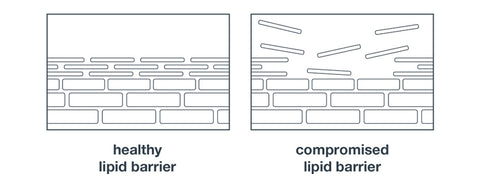
Main causes of dry skin
Dry skin is more than just dehydration. Here's everything you need to know!
story highlights
- People with dry skin naturally lack a strong lipid barrier, which leads to water loss and dehydration.
- If you know what causes really dry skin, you'll get more than just relief - you can treat dry skin right at the source.
If you have dry skin, you're probably looking for ultra-moisturizing products to get quick relief. But did you know that dry skin needs more than just moisture?
Recent science shows that healthy skin starts with the right balance between a strong lipid barrier, moisture, and an optimal microbiome (i.e., microbial environment). When any of these factors are out of balance, skin can look and feel compromised. People with truly dry (alipoid) skin do not naturally have a strong lipid barrier; they do not have enough lipids to maintain optimal skin health.
Let's take a closer look at the lipid barrier - and how you can help strengthen your barrier to maintain healthy, hydrated skin.
What is the lipid barrier?
Think of lipids as the "mortar" between the "bricks" of your skin, the corneocytes. This lipid barrier is found in the stratum corneum (the outermost layer of skin) and is our first line of defense against internal and external factors that can affect skin dryness. A strong lipid barrier helps prevent excessive water loss and keeps out external assaults such as UV radiation, heat and cold, and environmental irritants.

What happens when the lipid barrier of the skin is compromised?
When the skin's lipid barrier is weakened, water loss, also known as dehydration, occurs first. This leads to flaky, dry, dull skin and fine lines of dryness. At this point, the skin is more susceptible to environmental damage and signs of premature aging.
What else causes a weak lipid barrier?
If you have dry skin, your skin naturally lacks a strong lipid barrier - but there are other factors that can affect barrier performance. By paying attention to these factors, you can better manage your dry skin.
- Aging degrades the skin's natural lipids over time.
- Seasonal changes such as low temperatures and low humidity can lead to a decrease in lipids and increased sensitivity.
- Cleansing, excessive exfoliation and certain skin care ingredients - including alcohol, acetone and harsh surfactants - can damage the skin barrier.
- Dietary changes, including reduced fat consumption, can lead to lipid deficiencies.
- Stress, UV exposure and some diseases can also damage the skin barrier or delay healing.
What does dry skin need?
With all the complex factors that can affect dry skin and lipid barrier restoration, the solution is relatively simple: focus your skincare on products that nourish your lipid barrier. Look for products that are rich in plant oils and contain ingredients such as ceramides, fatty acids (e.g. palmitic acid, stearic acid, myristic acid) and sterols.
Dermalogica's Intensive Moisture Balance deeply nourishes 10 layers to restore the skin's lipid barrier, while theIntensive Moisture Cleanser even removes makeup with long-lasting results while conditioning the skin. Both products contain the state-of-the-art BioReplenish Complex™, which delivers a proven combination of key barrier lipids at the molecular level to strengthen skin's natural resilience and support barrier regeneration.
Need help choosing the right products for your dry skin? Talk to a professional skin therapist who can perform a thorough Face Mapping® skin analysis to help you get your healthiest skin ever, or try virtual face mapping® through our AI-driven analysis.

